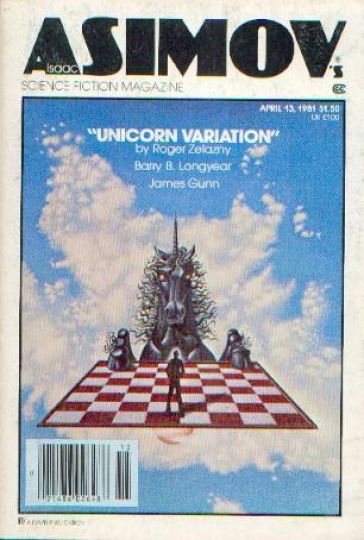Kris:
I have read through this a few times now and I keep feeling like I am missing something.
Unlike the Zelazny I have read (which I admit has been in his all been in his earlier period) this is incredibly verbose, none of the lightness of touch or beauty that you would find in say “A Rose for Ecclesiastes” or “Lord of Light”. Whilst those were a joy to read, I found this a chore. And whilst there was some stuff in there about the possibility of World War 3, it mostly seemed to be built around the incongruity of mythological creatures drinking beer and playing chess. I just didn’t understand quite the point of any of it.
It is like reading a satire of something I haven’t actually encountered before but does not work as a standalone. I came out feeling puzzled instead of delighted…
Brian:
Might be my third time reading this. Not in a row, but over the span of a couple years. I like Zelazny, although like a lot of people I’m not as familiar with his ’80s material, though clearly, he was on good terms with fandom at that time; he won three Hugos in the ’80s! “Unicorn Variation” is a comedic fantasy that was published in Asimov’s… for some reason.
It’s undoubtedly frivolous, although I wouldn’t say thematically empty. For such an upbeat story where the characters are all drunk for at least most of it there’s a lot of discussion about genocide, as well as mankind’s place in a universe where “superior” mythical creatures like unicorns and griffins can just waltz right in. Tlingel is an interesting antagonist because of how affable he is and yet how casual he is about the prospect of human extinction, though he sees that as fair game; he does, after all, treat mankind more humanely than mankind treated the dodo, and he clearly thinks there’s a similar gap between the races.
This is a chess story, a barroom story, a fantasy, but it’s also a western, or at least noticeably western-inflected. Even the font used for the title in the magazine version is western-inspired (I’m not sure what the name of the font is, though). The chess game happening over a span of months is like a duel, and I don’t think it’s a coincidence that Tlingel is black-coated, like how the villain in a stereotypical western would be dressed in black or very dark grey. Tlingel’s blackness also perhaps signifies him as a harbinger of death, although the ending is very much a happily ever after.
This is Zelazny mashing a ton of disparate things together like he’s a kid playing with Transformer and Godzilla figurines. His introduction to the story in Unicorn Variations explains its weird existence, and on its own is also pretty entertaining.
Kit:
The only Zelazny I’ve read prior to this was the first Amber book, which I disliked so thoroughly that I didn’t notice how good he is with language. The descriptions, the sentence-level prose, are very evocative and quite pretty– though apparently SF writers only know chess. There are other games, people. Other strategy games, even. I do like it– but I tend to like genre mashups, and this here is an example of the “fantasy kitchen sink” genre. It’s a Western, it’s an apocalypse, it’s a fantasy… and it absolutely did not end up where I was expecting it to, which I think is part of what I like about it. It starts out like a standard “playing a game with death” story, sidesteps into a trickster story, and ends with a swerve into making friends. It completely subverts expectations but every step it in it makes sense following from the previous steps, which is a hallmark of good plotting. This one is pretty good!

